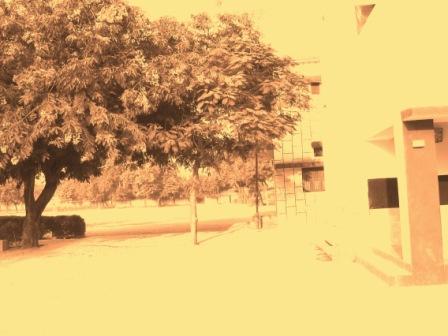Jigar's verse moves like a river - effortless. Beautiful to behold in its natural ebb and flow, yet deep and much layered. His 'Shaayar-e-Fitrat' is in many ways perhaps a 'song of myself' in its own poetic tradition, as Walt Whitman would put it in his.
Balancing the literal and the implied, and also attempting to preserve somewhat of the original beauty of Jigar's verses, this took me quite some time to translate...but I loved every moment of it (I've followed the verse order of my earlier post).
By Nature A Poet
[By Jigar Moradabadi. Interpretive translation by Siyaah]
By nature a poet, when I do reflect-
As a spirit I soar through nature's every speck. [1]
Estrangement from you, O friend, I so dread-
As if an aspect of life disappears from life's every aspect. [2]
Alas, these opressive constraints- these reasons to forsake love,
She attempts to convince me, and I, - to convince her back. [3]
Behold my courage, behold my state:
I tangle up yet again- the strands I have untangled. [4]
Bravo, O deathwish, towards the killer's lair-
Humming, dancing and swinging- I am on my way. [5]
Your congress, your displays- who then cares for restraints,
Here, I arise, and here, - I am out and on my way. [6]
One heart, and a relentless storm of accidents, O Jigar,
A piece of glass, shattered on every rock I've met. [7]
-----
Translator's notes:
[Couplet 1] fikr: to be concerned about something; on its own it also implies to reflect about the world / life with care and concern, often in a spiritual sense.
zarra-zarra: literally means atom or smallest particle. In this context it implies nature's smallest possible particle, thus I chose 'nature's every speck'.
samaa jaata: literally means 'come to reside in / possess'. I have used 'soar through' as a derivative meaning that preserves the effect in English.
[3] wo: the third person pronoun in Urdu can apply to both genders, though I use the female gender here.
tark-e-mohabbat: literally, forsaking of love.
[5] shauq-e-shahaadat: literally, shauq means desire; shahaadat means 'to witness (the truth) / to be martyred'. I have used the idiomatic 'deathwish' familiar in English.
ku-e-qaatil: literally, residence of killer. Also implies 'residence of beloved', as qaatil is also a term of endearment (similar to 'killer looks'). 'Lair' fits the dual meanings here well with its usage as 'den' and 'a resting place'.
[6] mehfil: literally means a gathering or congress of people, and can also mean tribunal. 'teri mehfil' means 'your gathering', and is an expression that could imply 'a gathering in your honor / where you are in-charge / where you are the most cherished'.
[7] toofaan-e-hawaadis: literally toofaan means storm, and hawadis is the plural of haadsa i.e. accident, misfortune, calamity, tragedy.
In the tradition of the ghazal, the poet signs his poem in the last couplet. Jigar is the non-de-plume or takhallus of Ali Sikander, and his last name, Moradabadi, derives from the city of his roots. Jigar literally means 'liver', which was traditionally considered the 'seat of courage', and sometimes like the heart, also the 'seat of love'. The word jigar thus generally equates with courage, and here interestingly the poet exclaims 'O Courage' while metaphorically describing the uneven battle of his life in the last couplet.
As here, I'll mostly try to introduce poets through their poetry, rather than the other way round. A poet's work is the best introduction.
Subscribe to:
Post Comments (Atom)






2 comments:
whoa...u sure have a way with words!
[phoenix]
am not so sure about myself...but you certainly do have a way with words! thanks!
Post a Comment